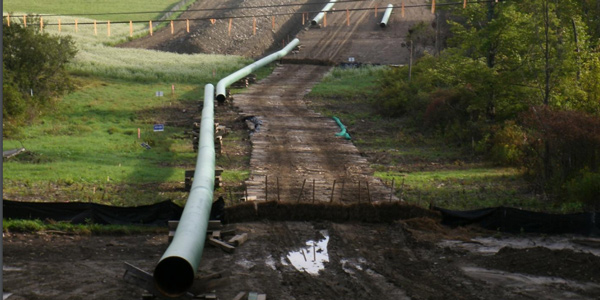By Rich Heidorn Jr.
FERC will open a 60-day comment period on potential changes to its policy statement on the permitting of natural gas pipelines, acknowledging that it may have to reconsider how it balances project benefits against adverse consequences in light of the shale gas revolution, global warming concerns and other changes since it last considered the issue in 1999.
All five commissioners said Thursday they welcomed the Notice of Inquiry (PL18-1), which FERC Chairman Kevin McIntyre had promised at his first meeting in December. (See FERC to Review Gas Pipeline Approval Process.)
But given the increasing contentiousness over pipeline expansions, it’s unlikely the commission will find consensus on all issues on which the NOI seeks comment. (See FERC Whipsawed on Pipeline Policy in House Hearing.)
Flashpoints
The biggest flashpoint may be the debate over how the commission evaluates the greenhouse gas impacts of new pipelines under the Natural Gas Act (NGA) and National Environmental Policy Act (NEPA). The NOI also noted “increased concerns” by landowners and communities affected by proposed projects as the total miles of interstate pipelines approved by the commission annually hit a peak of 2,739 miles last year.
Another point of contention could be calls for speedier pipeline approvals. The NOI says the commission “is committed to carrying out” President Trump’s executive order 13807, which calls for completion of all federal environmental reviews and permitting processes for infrastructure projects within two years.
“The commission’s aim in this proceeding is the same as in the policy statement: ‘to appropriately consider the enhancement of competitive transportation alternatives, the possibility of over building, the avoidance of unnecessary disruption of the environment and the unneeded exercise of eminent domain,’” FERC said.
McIntyre said the commission’s issuance of the NOI does not mean FERC will ultimately change its current procedures. He said it will apply the current rules to pending applications on a case-by-case basis during the inquiry. “The commission will consider only generic issues and will not consider any comments that refer to open, contested commission proceedings,” the NOI warned.
1999 Policy Statement
The 1999 policy statement followed moves to reduce regulation and increase competition in the industry under the Natural Gas Policy Act of 1978 and FERC Order 436, which allowed local distribution companies and industrial customers to buy gas directly from producers or merchants and transport their gas on interstate pipelines.
The policy statement said the commission will consider whether a proposed project’s anticipated public benefits outweigh its adverse effects on economic interests. If so, the commission then analyzes the project’s environmental impacts in reaching a conclusion on whether a project is required by the public convenience and necessity.
Four Topics of Inquiry
The commission asked for comments on four topics:
- The reliance on precedent agreements to demonstrate project need, and how contracts with pipeline affiliates should be treated (e.g., “Should the commission examine whether the proposed project meets market demand, enhances resilience or reliability, promotes competition among natural gas companies, or enhances the functioning of gas markets?”);
- Landowner interests and the use of eminent domain (e.g., “Should applicants take additional measures to minimize the use of eminent domain?”);
- The evaluation of alternatives and environmental effects under NEPA and the NGA (e.g., “Are there any environmental impacts that the commission does not currently consider in its cumulative impact analysis that could be captured with a broader regional evaluation?”); and
- The efficiency and effectiveness of the commission’s certificate processes (e.g., “Should certain aspects of the commission’s application review process (i.e., pre-filing, post-filing and post-order-issuance) be shortened, performed concurrently with other activities or eliminated to make the overall process more efficient?”).
Comments will be due within 60 days of the publication of the NOI in the Federal Register.





